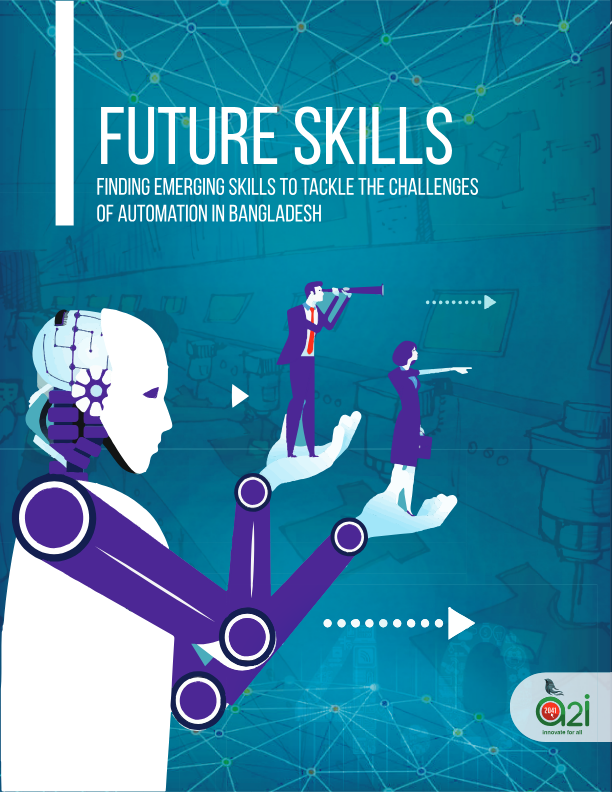Our Initiatives
a2i’s Future of Work Lab, aims to address the changing nature of work, workforce and workplace, is exploring the potential of a data driven adaptive system for skills and employment in Bangladesh. The specific objectives of this lab are- ensuring full and gainful employment through entrepreneurship and skills development; supporting responsible business practices; accelerating inclusive and sustainable economic growth; facilitating knowledge, experience, and expertise sharing among the relevant stakeholders and partner countries of the Global South.
Acknowledging the fact that the exercise of ‘visioning’ is as important as any vision in and of itself, a2i worked organized a series of policy workshops with government ministers, secretaries, CEOs, heads of business chambers, etc. These workshops were informed by commissioning research studies with all appropriate stakeholders – for both domestic and global markets.
Simultaneously, to push the boundaries of future thinking, a2i catalyzed a series of ‘Future Skills’ projects within the government and private sector. 50 4IR skills projects were launched in 2019. In 2021, with Cabinet Division and a2i facilitated in the scaling up of 86 4IR skills projects undertaken by several govt. organizations. 4IR based curriculum for 30 occupations have already been developed and most notably, skills development programs have started on several 4IR occupations such as Smart Electrical and Electronics Systems, Blockchain Technology, Maritime Autonomous Surface Ship (MASS) Operation, Augmented Reality and Virtual Reality (AR/VR), 3D Printing etc.
Bangladesh’s labor force of 82 million is growing with the addition of 2 million youths each year. Many of these new entrants are facing difficulties in finding employment as they are unaware of which skills are required for which jobs. While there are approximately 13,000 public and private skills training providers, they mostly offer supply-driven courses.
The National Intelligence for Skills, Education, Employment and Entrepreneurship (NISE) is a one-stop data platform that offers a broad spectrum of unique services. On the supply side, it offers real-time data which can allow skill service providers to identify the skills in demand through job forecasting and analyzing market-driven occupations. Participants in various skills training programs are automatically added to a central youth database. This database offers the youth a number of facilities such as career counselling and apprentice opportunities. The relevant ministries and government departments can also make use of the platform’s real-time data to formulate more informed policies.
On the demand side, NISE acts as an integrated job recruiting platform for public and private job providers alike, automatically filtering for suitable candidates. It allows industries to directly place demand for skilled human resources to specific skills service providers. NISE’s 4IR dashboard provides data to industries and entrepreneurs about emerging trends on job opportunities and job replenishment, paving the way for better decision making in business plans.
NISE has also been declared as a global best practice by UNDP’s Chief Digital Office (CDO) in New York. The initiative is being replicated in Jordan and Somalia.




